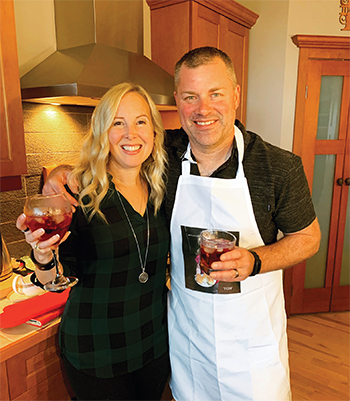Prostate Cancer Survivor
If it can happen to me, it can happen to you

When Don Helgeson learned his PSA was elevated, he had no idea what PSA stood for or why it should be checked. After being diagnosed with prostate cancer at 51, he made it his goal to ensure other men were educated about the importance of having their PSA level checked annually. Today, Don is considered NED (no evidence of disease). He actively shares his story to help other men realize they are not alone when facing a prostate cancer diagnosis.
Having Lynch syndrome automatically increases the risk for certain types of cancers, so when I found out I had it, I knew that cancer would always be a part of my life. But after beating malignant melanoma at 27 and colon cancer at age 37, I thought I was ahead of the game — until I was diagnosed with prostate cancer.
With retirement from the Royal Canadian Mounted Police around the corner, I went for standard bloodwork then checked my lab results on the portal. I had been working hard at lowering my cholesterol and was really excited to see how great my numbers were. But then I noticed an exclamation mark by my prostate-specific antigen (PSA) result. I probably shouldn’t have, but I Googled what a PSA of 12.2 meant and was shocked to read that it likely meant I had prostate cancer.
I didn’t even know what a PSA was. I really wanted someone to talk to, to confide in and find out what I was facing, but I didn’t know anyone who had been diagnosed with prostate cancer. I didn’t know where to turn. I eventually found support groups on Facebook, and I decided right away that I’d be open about my diagnosis so that other men didn’t feel as lost as I did.
I wrote down everything — my treatments, my fears, the sensitive side effects from surgery. Just getting my thoughts down helped me so much as I worked through the physical pain from surgery and the mental anguish I was feeling.
Like most men who have a radical prostatectomy, I had incontinence and erectile dysfunction. The big unknown was how long they would last. My wife Lisa is 7 years younger, and I admit that I was concerned about how these side effects would affect our marriage. Of course, she was devastated when I was diagnosed, but she assured me we would get through it together. We quickly learned it is a couple’s disease and that intimacy is much more than the actual act. She is my rock.
Something I did right away was let my male family members know and I encouraged them to get tested. Colon cancer ran in my family, which is why I’d had the Lynch syndrome testing. My uncle passed away from prostate cancer, but there wasn’t a lot of evidence that it was connected to Lynch syndrome, so prostate cancer was not on our radar. However, research is uncovering that it may indeed be connected.
Because I’m young, open and comfortable in front of people, a good friend who is a journalist encouraged me to share publicly what I’d written to educate men about getting their prostate checked to help remove the stigma of having a prostate exam. The PSA is a blood test, so that is no big deal. But the next step is a digital rectal exam and, like many men, I was not interested in having that. Had I been more informed and had one done sooner, I may have been able to catch the cancer at an earlier stage.
My Gleason score was initially a 7. However, the pathology on the prostate after surgery showed it as a 9. That usually means it has metastasized outside the prostate but, luckily, mine hadn’t. I’ve met men who are diagnosed at Stage IV and they’re just trying to just stay alive. You don’t want to face that, especially when there are ways to catch it early.
Before I went public with my story, I talked with my wife and three adult daughters from my previous marriage to make sure they wouldn’t be embarrassed by the very personal information I’d be sharing. They were 100 percent behind me.
I started by posting on Facebook. Before long, I got messages back from friends telling me they’d been tested or that their husbands or boyfriends had been tested. It made me feel good and did wonders for my mental health.
My audience expanded when I became involved in Facebook groups for men only that are dedicated to prostate cancer. The idea is that men will be more comfortable talking about things like incontinence and ED without women in the conversation. We share things that have worked for us, such as doing Kegel exercises before and after surgery to help with incontinence. Every time I engage with others in a group, I learn something or I feel like I’m able to help other men by sharing things that have worked for me.
My follow-up labs show I am NED, and I am so grateful. I will continue reaching out to others and hope to educate even more people about the importance of prostate health and the value of support. I don’t want anyone to ever feel like they are alone.


